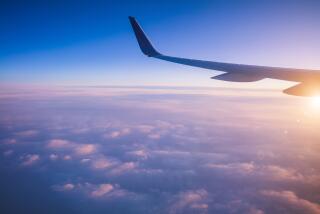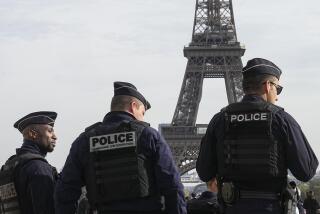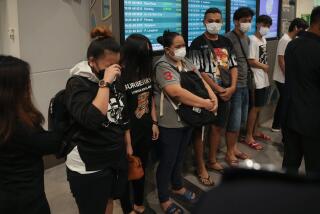Hijack Alerts at Asian Airports : Security Crackdown Turns Up Fake Visas
- Share via
MANILA — An alert among Asian airports against possible hijackings has revealed a large number of people traveling with fake documents.
Manila airport officials said these would-be immigrants have been bounced back and forth by countries that did not want them.
“It’s like a Ping-Pong ball,” said Ruben Domingo, head of immigration intelligence at Manila International Airport.
Airports in the region have tightened security since a warning early this month that Palestinian guerrillas planned to hijack an Asian airliner.
Domingo said that since then alert immigration personnel have been turning away one or two foreigners a day with fake or insufficient travel documents, most of whom are from Asia or the Middle East. That was up from an average of two or three a week over the last six months.
Fake Canadian Visas
He said that in the last two days of December officials expelled three Chinese holding fake Canadian visas, an Iraqi with an altered Saudi Arabian passport and a woman describing herself as Palestinian and carrying a false U.S. passport.
He said many people turned away were sent back and forth several times between the same countries. A Chinese-speaking man with a fake Filipino passport was sent back and forth between Hong Kong and the Philippines five times, he said.
A Western official of an international humanitarian organization said some individuals without legal papers spent years “in orbit,” either locked away in immigration detention centers or deported from one country to another.
Domingo said that for years Manila had the reputation of being one of the easiest capitals to travel through illegally, but security had become tighter over the last year.
Last February the immigration commissioner described Manila as the “world’s capital” for obtaining fake passports, with around 80 syndicates operating in the city.
Fakes Previously Used
Domingo said many of the forged travel papers recently confiscated indicated that they had been used successfully before in getting the illegal traveler through the airport.
“Things are a lot stricter now. . . . We can no longer accept the rejects of other countries,” he said.
In Canberra, an immigration department spokesman said Australia deals with about 2,000 cases of forged passports a year, and considers itself one of the toughest countries to enter using forged documents.
In Japan an immigration official at Tokyo International Airport said about 7,500 foreign arrivals--mostly from Asian countries--were refused entry in 1988 because of forged entry documents.
The Japanese Foreign Ministry said Japan plans to suspend its mutual visa exemption agreements with Bangladesh and Pakistan due to an increase in illegal entrants.
More to Read
Sign up for Essential California
The most important California stories and recommendations in your inbox every morning.
You may occasionally receive promotional content from the Los Angeles Times.










